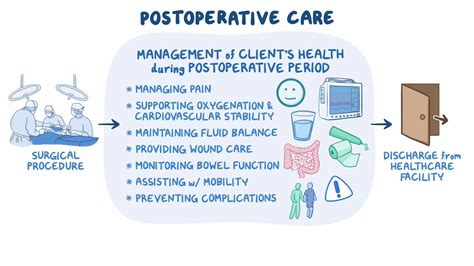Intro
The gallbladder is a vital organ that plays a crucial role in the digestive system, storing bile produced by the liver and releasing it into the small intestine to aid in the digestion of fats. However, when the gallbladder becomes diseased or inflamed, surgical removal may be necessary. If you or a loved one is undergoing gallbladder surgery, it's essential to understand the recovery process and what to expect during this time. In this comprehensive guide, we'll delve into the world of gallbladder recovery, exploring the importance of post-operative care, the benefits of a healthy lifestyle, and the potential risks and complications associated with gallbladder removal.
Gallbladder surgery, also known as cholecystectomy, is a common procedure that can be performed using open surgery or laparoscopic techniques. The type of surgery used will depend on the individual's overall health, the severity of the gallbladder disease, and the surgeon's professional judgment. Regardless of the surgical method, the recovery process is crucial for ensuring a smooth and successful outcome. A well-planned recovery strategy can help minimize the risk of complications, reduce discomfort and pain, and promote a speedy return to normal activities.
The recovery time for gallbladder surgery can vary depending on the individual's overall health, age, and the complexity of the procedure. Generally, patients who undergo laparoscopic surgery tend to recover faster than those who undergo open surgery. On average, patients can expect to spend several days in the hospital after surgery, followed by several weeks of rest and recuperation at home. During this time, it's essential to follow the surgeon's instructions carefully, attending follow-up appointments and taking medications as prescribed to ensure a smooth and successful recovery.
Gallbladder Recovery Time Frame

Factors Affecting Recovery Time
Several factors can influence the recovery time for gallbladder surgery, including the type of surgery, the individual's overall health, and the presence of any underlying medical conditions. Patients who undergo laparoscopic surgery tend to recover faster than those who undergo open surgery, as the smaller incisions result in less tissue damage and trauma. Additionally, patients who are younger, healthier, and have fewer underlying medical conditions tend to recover faster than those who are older, have multiple health problems, or are in poor physical condition.Post-Operative Care and Management

Diet and Nutrition
A healthy diet and adequate nutrition are essential for promoting wound healing, reducing the risk of complications, and supporting overall health and well-being. Patients should focus on consuming a balanced diet that is rich in fruits, vegetables, whole grains, and lean protein sources. It's also important to stay hydrated by drinking plenty of water and other fluids, avoiding caffeinated and carbonated beverages that can irritate the stomach and worsen digestive symptoms. In the immediate post-operative period, patients may need to follow a liquid or soft food diet, gradually introducing solid foods as the body begins to heal.Potential Risks and Complications

Long-Term Outlook and Prognosis
The long-term outlook and prognosis for patients who undergo gallbladder surgery are generally excellent, with most individuals experiencing significant improvements in their symptoms and quality of life. However, some patients may experience persistent or recurring symptoms, such as diarrhea, abdominal pain, or fatigue, which can be managed with medication and lifestyle modifications. Additionally, patients who undergo gallbladder surgery may be at increased risk for developing certain health problems, such as osteoporosis, anemia, or vitamin deficiencies, which can be prevented or managed with proper nutrition and medical care.Lifestyle Modifications and Prevention Strategies

Coping with Emotional and Psychological Challenges
Gallbladder surgery can be a stressful and emotionally challenging experience, particularly for patients who are experiencing anxiety, depression, or other mental health problems. Patients should prioritize their emotional and psychological well-being, seeking support from family, friends, or mental health professionals as needed. This may include counseling, therapy, or support groups, which can provide a safe and supportive environment for patients to share their feelings and connect with others who are experiencing similar challenges.Conclusion and Final Thoughts

What is the typical recovery time for gallbladder surgery?
+The typical recovery time for gallbladder surgery can vary depending on the individual's overall health, age, and the complexity of the procedure. Generally, patients can expect to spend several days in the hospital after surgery, followed by several weeks of rest and recuperation at home.
What are the potential risks and complications associated with gallbladder removal?
+The potential risks and complications associated with gallbladder removal include infection, bleeding, and adverse reactions to anesthesia, as well as more serious complications such as bile duct injury, bowel obstruction, and respiratory problems.
How can I promote my recovery and reduce the risk of complications after gallbladder surgery?
+To promote your recovery and reduce the risk of complications after gallbladder surgery, it's essential to follow the surgeon's instructions carefully, attending follow-up appointments and taking medications as prescribed. Additionally, prioritize rest and relaxation, avoiding heavy lifting, bending, and strenuous activities for several weeks after surgery. A healthy diet and regular exercise can also help promote wound healing, reduce the risk of complications, and support overall health and well-being.
We hope this comprehensive guide has provided you with the information and resources you need to understand the recovery process for gallbladder surgery. Whether you're a patient, caregiver, or healthcare professional, we encourage you to share your thoughts, experiences, and questions in the comments below. By working together, we can promote greater awareness, understanding, and support for individuals undergoing gallbladder surgery, and help them achieve a smooth, successful, and sustainable recovery.
